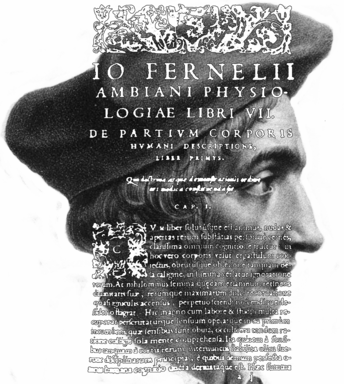Jean Fernel1497–1558
Fernel introduced the term ‘physiology’ in his Physiologia as part of his Universa medica. Fernel’s portrait is combined with the title page of a later edition. Physiologia was published 24 years after Vesalius’s revolutionary book on human anatomy De Humani Corporis Fabrica. Unlike Vesalius, Fernel did not include illustrations in his accounts of anatomy or physiology. In the context of medicine, anatomy precedes physiology: understanding the structure of organs, like the brain, is required before functions can be applied to its parts. However, function was assigned to the brain before the gross anatomy of its structure was discerned by the dissectors. Behaviour, rather than anatomy, determined the functions assigned to the three ventricles by medieval scholastic philosophers. The outer senses were restricted to five – seeing hearing smelling tasting and touching – and these were transformed into inner senses in the ventricles. The anterior ventricle was general considered to be concerned with perception, the central one with reasoning and the anterior with memory. They were often represented in the shape of circles so that they, like the heavenly bodies, took on the perfect form. Such a scheme did relate function to structure, but it was based on philosophy rather than physiology. Fernel was not a medical revolutionary, but it has been said that the Physiologia “is probably the fullest and most clearly organized exposition of Renaissance Galenism that was ever written and almost immediately became a text, like those of Galen or Aristotle, upon which others commentated”. Fernel distinguished three differences between humans and other living forms – an upright posture, a large brain, and feely movable hands. The brain was “the seat of the mind and its parts; the mind being endowed with numerous faculties, man has rightly been provided with a larger accommodation for it than the other creature possess, and this accommodation is associated with more instruments.” Later in the book he extols further the virtues of this organ: “The brain is the citadel and dwelling of the human mind, the abode of thoughts and of the reason, the wellspring and origin of movement and of every sense; it occupies the highest point of the body, looking upwards, nearest to heaven.”
